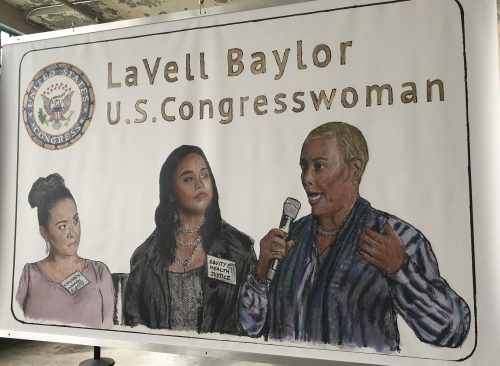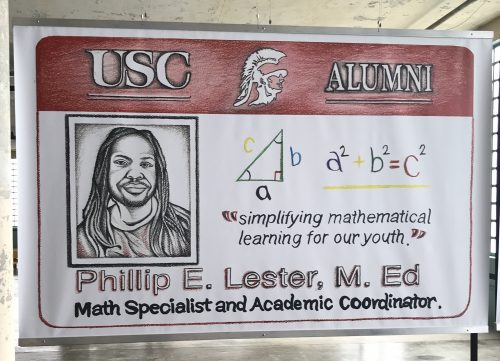Judgement is a hard-wired mechanism for survival, a natural instinct, and a defense mechanism. Most of us partake in constant judgment of people’s clothing, judgement of people’s words, judgment of people’s actions. However, more often than not it consumes so much of our mental energy unnecessarily.
The Tenderloin
During our first trip to our work we all hopped off the 38 at Leavenworth and Geary eager to make our way to visit the place we would be working for the next 8 weeks. I became increasingly nervous as I made my way down the street stepping over used needles, excrement, and broken glass. I pushed myself to keep an open mind, but part of me questioned why people didn’t place these items in a trash can rather than mindlessly discarding them on the street. Once I dismantled my judgmental attitude, the Tenderloin has become a place of great joy for me during my time here. Now, as I walk down the street to work I am in awe of the incredible murals, I smile at the kids walking to school, and sometimes I’m lucky enough to find a cute dog to say good morning to. Here is also home to Saigon Sandwich, the best banh mi shop in California (not to mention it’s only $4), where I get a toasty baguette on Friday’s for lunch. The neighborhood still isn’t perfect. I still feel uneasy as I see individual’s injecting drugs into their arm on my walks home, but instead of passing judgement I now know that harm reduction is a form of treatment. I hope the individual is visiting a needle exchange to prevent the spread of HIV and hepatitis and using sanitary water to decrease their infection risk. Many homeless individuals have undergone extreme trauma, eviction, suffer from mental health problems, and have overcome a plethora of other struggles. I have no right to judge their attempts to numb the pain as I walk back home to my Duke funded apartment.


Larkin Street
During our first week we were introduced to the clients as the “Duke interns”. Every time I heard that phrase I cringed. I didn’t want the clients to see us as these elite university students. I wanted to be seen as a peer, mentor, and someone they could find things in common with, and instead I was worried the youth would label us as different or try-hard. I had to remind myself that in the excitement of these introductions these staff members weren’t trying to build walls between us and the clients. After being at Larkin for 5 weeks, I realized these worries were definitely overly inflated in my head. Most of the youth couldn’t care less what school I go to. They want to destroy me in a game of Qwirkle or chess, ask me what I did over the weekend, tell me about a book they’re reading, or share with me their dreams for companies they want to start. In the engagement center there are definitely many youth who don’t care to hang out with the interns, and I think it is important to come into the space cognizant of how we may be perceived. Being visibly open minded and accepting when talking to clients has been instrumental in forming relationships and initiating meaningful conversations.
More so than the clients, even some of our colleagues have made judgments about our cohort. In an introduction to their program, one staff member said we need to do an activity before we work for her, because we were “ivy leaguers” *said with a negative tone*. As a first generation, low income student, this label of elitism and privilege that was attached to me due to the place I go to school was disconcerting. I recognize the incredible amount of support I was given to allow me to attend Duke, but I still felt this generalization was unfair. Later the next week we participated in a step up, step back activity to “check our privilege”, and one member of our group was forced to step forward for many statements where the other 7 interns stayed put. As important as it is to acknowledge the extent of your personal privilege, this type of activity relies on the experiences of people with marginalized identities to create a powerful learning experience for people with privilege. If this staff member had been less quick to label us as rich, resume building snobs, a better activity could have been thought of to allow us to reflect on how our identities and backgrounds affect how we present ourselves and interact with clients. I do want to finish this discussion with a disclaimer: Every staff member at Larkin Street comes to work with a full heart, big smile, and this internal motivation to help others every single day. This small incident is so minor compared to the amount of encouragement and support I am provided by the numerous staff I have been lucky to work with.
Alcatraz
Even on our weekend excursions, my initial judgements have been misguided. Despite the many flaws of the US criminal justice and corrections system, as I walked through the empty cells of Alcatraz prison, I imagined the most horrific criminals behind bars. Yes, many of these men had committed serious crimes, but in reality it is important to remember that prisoners too are still people. This sentiment was reaffirmed as I saw a former inmate signing books in the gift shop, and as I ventured into the RealIDs exhibit. Here former prison inmates painted “ID cards” for themselves of who they had become after prison. There were teachers, social workers, artists, congresswomen, etc. An individual should never be defined by their mistakes, judged, or marked as irredeemable. This is reaffirmed at Larkin. A client came into class one day and apologized to the instructor for being gone the day before because he had been in jail. The instructor gave him a hug and told him that she was happy he was back in class today. Her actions completely lacked judgement, and her encouragement reminded me how important it is to provide positive affirmations without scrutiny.


These experiences have allowed me to be less quick to judge, and increasingly ready to self-correct as I learn from my mistakes, biases, and misconceptions. My unnecessary judgements create division and build unnecessary walls, and I need to continuously fight my judgements with empathy, kindness and compassion.
